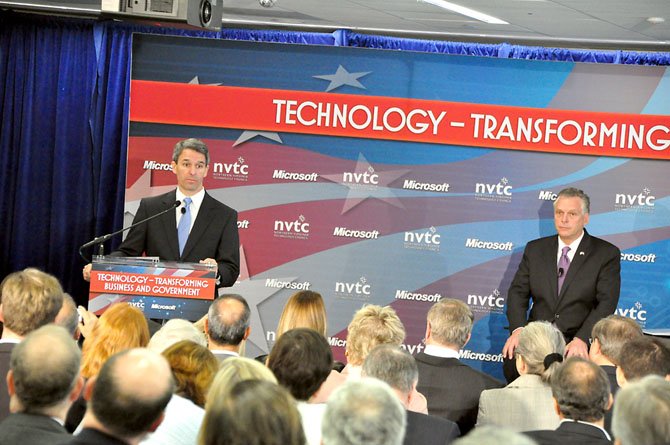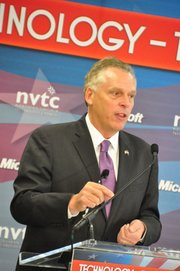From left, Virginia gubernatorial candidates Ken Cuccinelli and Terry McAuliffe address members of the Northern Virginia Technology Council Thursday, June 20. Photo by Alex McVeigh.
Reston — The Northern Virginia Technology Council hosted Virginia’s two gubernatorial candidates Thursday, June 20 at Microsoft’s Reston offices. Republican Ken Cuccinelli and Democrat Terry McAuliffe spoke about their goals for Virginia if elected, and also answered questions from panelists and audience members.
Cuccinelli, a former state senator for the 37th District, is currently Virginia’s attorney general, winning election to that position in 2009. McAuliffe is a former chair of the Democratic National Committee, and he co-chaired Bill Clinton’s 1996 campaign, as well as Hilary Clinton’s 2008 presidential campaign.
BOTH CANDIDATES said they are interested in helping Virginia weather tough economic times, particularly with the current sequestration dragging on, and the very real possibility of reduced federal spending in the near future.
McAuliffe said Virginia must diversify its economy, and that he has an open mind when it comes to attracting businesses, and said he is prepared to examine any and all kinds of incentives.
“What’s going to diversify our economy more than anything else is going to be IT. We are the leaders here in Northern Virginia, and I plan to take it to the next level,” he said. “Will I roll back any federal regulations that could adversely affect Virginia families or businesses? You bet. Like a dog to a bone, I’m going to do everything within my power.”
Cuccinelli said he would place less emphasis on incentives to lure businesses here, instead said he prefers to make the business climate one of the most friendly in the nation.
“[Incentives] do have a role to play. It’s something that we have to be careful with, because we don’t want to give unfair advantages to people, particularly if they’re paid for by the folks who have already put roots down here,” he said. “It isn’t enough to be the best place to do business. My goal for Virginia, especially Northern Virginia, it to make it foolish to leave. We’re going to have an awful lot of entrepreneurs right here that are going to be making that decision.”
McAuliffe said that a key part in attracting businesses is fixing the transportation problems in the region. He quoted statistics that said Northern Virginia drivers spend 67 hours per year in traffic, compared to 43 in Hampton Roads, which translates to billions of dollars lost in traffic.
“I think mass transit is something great for Virginia. It gets cars off of roads and puts people into mass transit and it’s a huge driver for economic development,” he said. “We need folks to get to Dulles Airport, our local world class airport, and come directly into Northern Virginia, then onto Washington. … We have to have the most efficient modern transportation system in the country if we’re going to grow Virginia’s economy.”
Cuccinelli said he felt a major change is needed in how Virginia addresses transportation problems, and cited that as a reason for why he didn’t support the recent state transportation funding bill.
“One of the problems with this bill is that it didn’t address what I believe are some of the fundamental challenges of transportation. We are over centralized, we’re one of the four most centralized states for transportation funding and decision making, and that’s a problem. We need the localities and regions to have more autonomy from Richmond,” he said. “If I’m elected, one measure of success will be that four years from now, the governor will have less power when it comes to transportation.”


